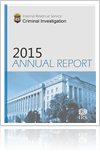The IRS Criminal Investigation Division (“CID”) has released its 2015 annual report, which includes information on the number of investigations, prosecutions, targets incarcerated, the impact of budget changes, and areas of focus in the coming year. You can read the entire report here . The report is 47 pages and contains a great deal of information, but we found several items interesting and worth special attention.
1. Cuts to the IRS Budget Have Not Helped CID Accomplish its Mission .
According to CID’s chief, the hiring freeze has caused a staffing shortage. Due to special agents retiring or leaving, the number of active CID special agents has fallen to “their lowest levels since the 1970s.” As a result, CID initiated 444 fewer cases during FY2015 than in FY2014. That resulted in 231 fewer convictions and 176 less prison sentences. The numbers are even worse when compared to FY2013 figures: There were 1,461 fewer investigations in FY2015 than FY2013. If CID’s mission continues to be supporting tax administration and fostering voluntary compliance by enforcing the tax laws, then this dramatic decrease in the volume of cases being worked by CID cannot have a positive impact on our nation’s tax administration.
2. CID Devoted More Available Resources to Identity Theft Cases.
Identity theft fraud was listed first among the 2015 investigative priorities. However, given the overall decrease in investigations of all types, the number of identity theft cases actually fell from 1,063 in 2041 to 776 in 2015. CID special agents worked to prevent false tax refund claims that made use of personal information stolen during data breaches. The report notes that 22 different CID field offices launched “investigations linked to computer intrusions, account takeovers, and data compromises affection tax administration.”
3. Crackdown on “Abusive Preparers.”
We have seen many more tax preparers spending time as involuntary guests of the federal government because they engaged in a widespread practice of increasing the amounts of their clients’ refunds by creating false deductions, false claims for the Earned Income Tax Credit, or helping clients falsify business records or mischaracterize expenditures from small business accounts. This trend is the apparent result of CID making abusive preparer schemes another focus for enforcement action. The report contains several abstracts of such cases investigated by CID that uncovered massive and widespread fraud by preparers. This should underline several points for laypeople looking to choose a return preparer. First, “if it’s too good to be true, it probably is.” If a preparer is advertising their services by promising you the biggest refund you’ve ever received, go somewhere else. Second, “you get what you pay for.” If you are looking for the biggest refund possible for the lowest available fee, you’ll be at much greater risk of having your return prepared by someone other than a competent and reputable accountant.
4. International Investigations
CID continued to be busy in 2015 cracking down on illegal activity moving across international borders, including unreported foreign bank accounts and assets, and also “illegal source” international activity. Most notably, at least one CID special agent was instrumental in taking down “the Dread Pirate Roberts,” Mr. Ross Ulbrecht, the creator of the Silk Road website used to facilitate illegal transactions of all kinds.


